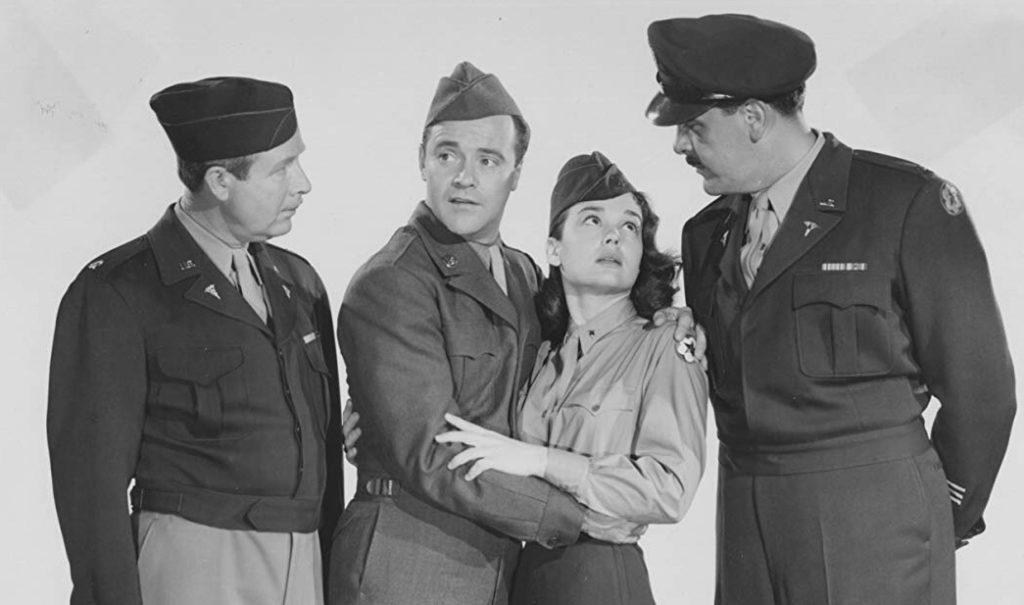Ernie Kovacs: Movie Star?
Ernie Kovacs is not necessarily remembered for his movie career, and it’s understandable. He was a unique voice in TV comedy, from its toddler days through his early death in January 1962. His presence on the small screen was non-stop, and his face was uniquely qualified to “read” on a 6×8-inch piece of glass across from your sofa in your living room. From 1957 to 1961 he supported Jimmy Stewart, John Wayne, Doris Day, Jack Lemmon, Frankie Avalon and Alec Guinness, usually as the meanie they were up against in the film’s plot.
Kovacs even took out an ad in Variety at one point, a full page ad (what other size was there for Kovacs?), in protest. “No more @#$% Captains!” it expostulated.

So, why did Kovacs go in to movies? He was such a brilliant TV comedian, and didn’t need to have a movie career. Especially one where he wasn’t necessarily doing out-and-out comedy…and especially comedy that was not even close to what fans then and now expected from him.
We have to remember that Ernie Kovacs started out trying to work in theater. He’d starred in a few of his high school’s shows in Trenton, and then came to NYC to study drama at the New York School of the Arts. His studies were curtailed by a severe illness that sent him back to NJ where, after months of treatment and eventually recovering (he snuck out of the TB ward he was stuck in), he wound up as a radio DJ for WTTM, the local radio station in his hometown of Trenton.
He became a local celebrity of some degree, known for his comedy bits between records and for live remotes. On the radio every day for about 8 years. This led to his taking his persona to WPTZ Channel 3 in Philly in 1951, doing a local wake-up show filling 2 hours. 5 days a week for about a year.
Which led, the following year, to his hosting a similar but half-hour length show in NYC on CBS. Sketches, bits, characters, interspersed with songs by Edie Adams and Peter Hanley. 5 days a week, for about 21 months. Cancelled, he wound up doing a similar show for DuMont, now as a late night show, Monday to Friday, for another year. Cancelled, he wangled a contract with NBC for a similar show, back in mornings but which wouldn’t start till end of 1955. During which time he got booked to do a morning radio disc jockey show 6a-9a for ABC radio.
The NBC show begins Dec 1955, the ABC radio show continues. Every day, 5 days a week, 6-9 AM on the radio, then 10:30-11:00 AM on TV. His wife now starring in her second Broadway show, Li’l Abner (the first was Wonderful Town). On top of ABC radio and the NBC late morning show, in the summer of ‘56 Ernie grabs the possible brass ring — because it could lead to a bigger, better show — of being a summer replacement for Caesar’s Hour. Working every day, 5 days a week, ABC radio early mornings, NBC TV late morning, the rest of the day writing and rehearsing a big-budget show that he’d hoped would lead to something better than the grind of creating and performing a daily morning show.
By Sept ‘56, the ABC radio show is over, as is the NBC morning show, and the summer replacement leads to nothing. He is now, after a 16-year grind, tag-team hosting “Tonight!” on the days Steve Allen cannot.
Two nights a week.
Ernie catches a break. Well, he grabs an opportunity that no one else wanted but, to compulsive gambler Kovacs, could also be a full house. NBC’s weekly 90-minute color spectacular is to feature Jerry Lewis, shortly after The Break-Up. Jerry, For reasons that made sense to Jerry, would only do the first hour. Only Kovacs bit at following Jerry.
The 30 mins of intimate dialogue-free comedy Kovacs presented in January 1957, literally titled “The Silent Show” and which followed an hour of Jerry Lewis, got him noticed. Got him a contract with Columbia Pictures. Got him on the cover of Life Magazine. Got him away from the daily grind of doing TV. Got him work as an Actor. Maybe not Broadway, but the kind of acting he’d set out to do…and on the polar-opposite schedule to TV.
The money was better, the schedule was more relaxing — leaving Ernie more time to either write or play (and lose at) cards — and there was that Hollywood climate after all those years in NJ, PA and NY.
Why wouldn’t he want to be in movies? The need for money and a creative outlet for what was Ernie Kovacs would eventually catch up with him and bring him back to TV, but for a few years Kovacs was finally doing what he’d thought he was going to back in those Trenton years.